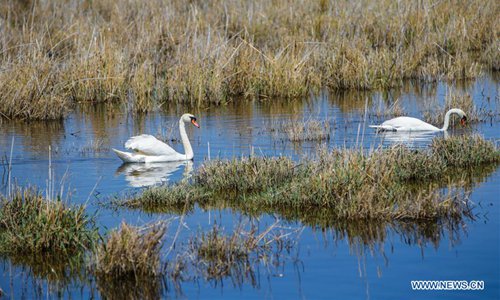
Photo: Xinhua
An outbreak of H5N8 bird flu among wild swans at Beijing's Old Summer Palace has been brought under control, the local animal disease prevention and control department announced on Tuesday, minimizing the possibility that the disease could spread.
The infections are unlikely to cause a wider epidemic, according to experts and the authority.
"The disease currently only affected some of the birds and has been effectively controlled. No infection has been seen in other areas," the animal disease prevention and control department in the city's Haidian district said.
The H5N8 bird flu caused the deaths of three black swans at the Old Summer Palace in Haidian district from January 22 to 25.
The infections won't spread among other animals or humans, partly because there are no poultry farms within five kilometers of the park, Zhu Yi, an associate professor at China Agricultural University in Beijing, told the Global Times.
Areas within three kilometers of a bird flu outbreak are classified as an epidemic area in China, and in such cases all the poultry will be classified as a high-risk group. "Such a limit is sufficient to control the spread of pathogens caused by diseased birds and their feces," Zhu said.
Yang Zhanqiu, a deputy director of the pathogen biology department at Wuhan University, urged other areas in China to carry out inspections to see if there are any other cases of H5N8 bird flu.
"The highly pathogenic avian influenza has multiple sub-types and a high mortality rate, and it spreads quickly among birds," Yang said. "The mortality rate of human infections (with some sub-types) can be as high as about 50 percent."
The H5N8 bird flu is not known to have ever infected humans, the government announcement said. The highly pathogenic avian influenza viruses aremainly transmitted through physical contact with infected poultry, their secretions and excrement, and it could also cause infections via respiratory and digestive tracts. Wild birds are easily cross-infected during migration.
Yang said that while humans can get the disease after being exposed to infected birds or contaminated objects, no large-scale epidemic among people has been observed worldwide.
The black swans were originally from Australia, and they had been living in Beijing's Old Summer Palace since February 2008, according to the announcement.
The animal disease prevention and control department in Haidian has carried out a risk assessment of the cases, which began to emerge last year, with H5N8 outbreaks occurring among wild and home-raised poultry in other parts of the world, including Europe, the Middle East and East Asia.
This was the third location in China to report cases of the H5N8 bird flu among wild swans over the last three months. North China's Shanxi Province reported an outbreak in November 2020, and East China's Shandong Province reported an outbreak on January 19.
Disinfection has been carried out at the surroundings, the authority said, and all the dead animals have been handled appropriately. All the 257 samples that were collected from wild bird habitats at the park came back negative for H5N8 bird flu.
To eliminate risks, the Old Summer Palace has sealed off the swans' living area and will disinfect all wild bird habitats and feeding venues three times a day. Each disinfection venue covers an area of 6,000 square meters.


